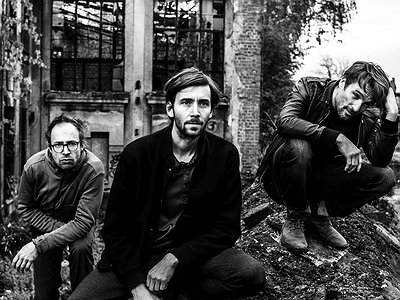Name: Shramm
Members: Jörg Wähner (drums), Florian Kästner (piano, electronics), Philipp Martin (bass)
Interviewee: Jörg Wähner
Nationality: German
Current release: Shramm's Androide Scrip is out via Edition Dur. Streamthe release here. The band will also support the album with a string of live performances:
22.04.2023 SHRAMM @ LeipJAZZig Festival, Schille Leipzig
29.04.2023 SHRAMM @ Bühne 7 Quedlinburg
11.05.2023 SHRAMM @ Nebenan Leipzig
21.09.2023 SHRAMM @ Belch Halle
22.09.2023 SHRAMM @Horns Erben Leipzig
If you enjoyed this interview with Shramm and would like to know more about the band, visit their official homepage. They are also on Instagram, Facebook, Soundcloud, and twitter.
When did you first start getting interested in musical improvisation?
In 2000, I happened to attend a jazz session in Leipzig for the first time in my life. I was immediately in love. That was my introduction to improvised music.
Which artists, approaches, albums or performances involving prominent use of improvisation captured your imagination in the beginning?
The Miles Davis LP Four & more has influenced me very much. Tony Williams on drums and Herbie Hancock on piano influenced me a lot.
Focusing on improvisation can be an incisive transition. Aside from musical considerations, there can also be personal motivations for looking for alternatives. Was this the case for you, and if so, in which way?
In fact, with the trio music, I wrote out composed music. That means I first wrote it out completely. I then brought these ideas or songs to the band rehearsal.
Only then did phases of improvisations emerge.
What, would you say, are the key ideas behind your approach to improvisation? Do you see yourself as part of a tradition or historic lineage?
Improvisation is timeless for me. From musical constructs which mostly arise during rehearsal and are later assembled, I like small phrases and loops on top of which I improvise and try out ideas.
What was your own learning curve / creative development like when it comes to improvisation - what were challenges and breakthroughs?
Improvisation is creativity on the instrument. Develop your creativity. Give the instrument a language.
My teacher and pianist at the time, Richie Beirach, gave me one thing. “Think in terms of motives when improvising.“
Tell me about your instrument and/or tools, please. How would you describe the relationship with it? What are its most important qualities and how do they influence the musical results and your own performance?
The relationship with my instrument is an everlasting love affair.
The drums can produce so many sounds and all in a rhythmic context. The instrument has qualities of power but at the same time can be so delicate in its sound production.
How do you feel your sense of identity influences your collaborations? Do you feel as though you are able to express yourself more fully in solo mode or, conversely, through the interaction with other musicians? Are you “gaining” or “sacrificing” something in a collaboration?
I'm literally always looking for collaborations. It's fun for me to develop ideas on my own and then develop them further with musician friends.
But in a band one person has to give the impulse. Then development and creativity can happen with other musicians. I'm literally working towards that.
Derek Bailey defined improvising as the search for material which is endlessly transformable. Regardless of whether or not you agree with his perspective, what kind of materials have turned to be particularly transformable and stimulating for you?
Loops, rhythmic phrases, chord progressions are a good place to start. Even if they are only 10 seconds long. Using these as a point of departure, an exciting development in improvisation can result.
The band Motorpsycho which I love very much, do this kind of thing all the time. They'll play 4 chords, creating a permanent tension and it never gets boring. In the end, the song will be 16 minutes long.
When you're improvising, does it actually feel like you're inventing something on the spot – or are you inventively re-arranging patterns from preparations, practise or previous performances?
As already mentioned, you should think in motives when improvising.
For example, in terms of drums, think of a rhythmic pattern and play with it. Or in relation to the piano, use a certain melody as a motif and play with it.
To you, are there rules in improvisation? If so, what kind of rules are these?
Again, motives.
In a live situation, decisions between creatives often work without words. How does this process work – and how does it change your performance compared to a solo performance?
Making music works without words, that's true. But communication during live playing mostly works with eye contact.
There are many descriptions of the ideal state of mind for being creative. What is it like for you? In which way is it different between your solo work and collaborations?
An example: With the band Apparat, where I play drums, there were, as I would put it, "magic moments" on stage at some concerts.
I had a good sound, was completely connected with my bandmates. It feels a little bit as though your consciousness is expanding. You are completely focused on yourself and on the others. A very great feeling.
How do you see the relationship between sound, space and performance and what are some of your strategies and approaches of working with them?
The flow must be right. The environment also plays an important role. So does the sound on stage.
Most of the time you only notice after the performance how the conditions have influenced the music making.




